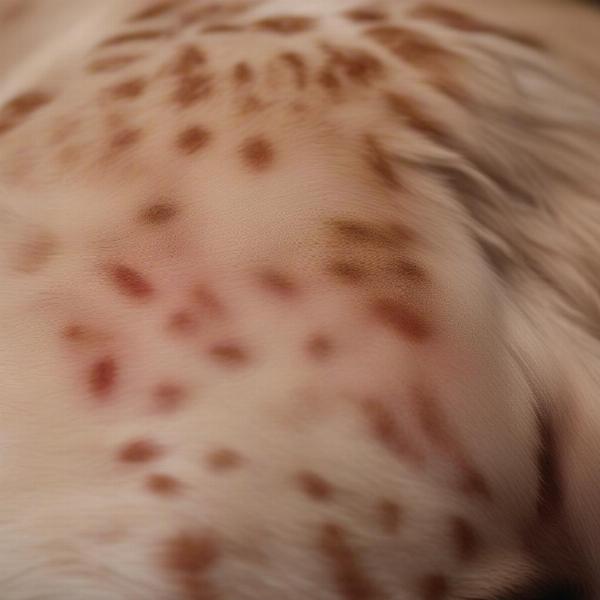Powder for dogs’ skin can be a useful tool in a pet owner’s arsenal, but it’s essential to understand when, why, and how to use it correctly. Choosing the right powder and applying it properly can help alleviate certain skin issues, while improper use can exacerbate problems. This guide will explore the different types of powders available, their benefits, potential risks, and how to choose the best one for your furry friend.
Understanding the Need for Skin Powder
 Dog with dry, itchy skin problems
Dog with dry, itchy skin problems
Why might you need powder for your dog’s skin? Several factors can contribute to skin irritation in dogs, including allergies, parasites, infections, and environmental factors. Powder can offer relief from itching, absorb excess moisture, and help soothe irritated skin. However, it’s crucial to address the underlying cause of the skin issue, not just treat the symptoms. A visit to the vet is always recommended to diagnose the root problem.
Types of Skin Powders for Dogs
Several types of powders are available for dogs, each with its own benefits and drawbacks.
Medicated Powders
These powders often contain antifungal or antibacterial agents to treat specific skin conditions. They are usually prescribed by a veterinarian and should be used as directed.
Natural Powders
These powders, often made from cornstarch, oatmeal, or other natural ingredients, can be a gentler option for sensitive skin. They can help absorb moisture and soothe irritation.
Anti-Itch Powders
Formulated to relieve itching, these powders may contain ingredients like calamine or hydrocortisone. However, always consult with your vet before using hydrocortisone-based products.
Choosing the Right Powder
The best powder for your dog depends on the underlying skin condition. Always consult your vet for a diagnosis and recommendation.
Is iodine safe for dogs?
is iodine safe for dogs It’s best to avoid using iodine-based products without veterinary guidance.
How to Apply Powder Safely
Apply a small amount of powder directly to the affected area, avoiding the eyes, nose, and mouth. Part the fur to reach the skin, and use a light dusting. Avoid over-applying, as this can cake and irritate the skin further.
When to Avoid Powder
Powder is not always the best solution. Avoid using it on open wounds or deep infections. If your dog has breathing problems, powder can exacerbate them. If you notice any adverse reactions, discontinue use immediately and consult your vet.
Potential Risks and Side Effects
While generally safe, powders can cause some side effects, such as:
- Inhalation: Avoid letting your dog inhale the powder, which can cause respiratory irritation.
- Skin Irritation: Some dogs may be sensitive to certain ingredients.
- Ingestion: While most powders are non-toxic, large amounts can cause digestive upset.
What’s the Best Hot Dog for My Dog?
best’s hot dogs While we’re discussing skin care, it’s worth remembering that a balanced diet is crucial for healthy skin. Avoid feeding your dog processed foods like hot dogs, as they can contribute to skin problems.
Dr. Emily Carter, DVM, a renowned veterinary dermatologist, advises, “While powders can provide temporary relief, it’s crucial to identify and treat the underlying cause of your dog’s skin issues. A comprehensive veterinary examination is the first step towards healthy skin and a happy dog.”
Dr. James Miller, DVM, a seasoned veterinarian, adds, “Always follow your veterinarian’s instructions when using medicated powders. Misuse can lead to complications and worsen existing conditions.”
Conclusion
Powder for dogs’ skin can be a valuable tool for managing certain skin conditions, offering relief from itching and irritation. However, proper usage and veterinary guidance are essential. Always consult your vet before starting any new treatment for your dog’s skin, and remember that addressing the root cause is paramount for long-term health and well-being.
FAQ
- Can I use baby powder on my dog? It’s generally not recommended, as baby powder can contain ingredients that are harmful to dogs if inhaled or ingested.
- How often can I apply powder to my dog’s skin? Follow your veterinarian’s instructions. Generally, applying powder once or twice daily is sufficient.
- What should I do if my dog licks the powder? While small amounts are usually not harmful, large quantities can cause digestive upset. Monitor your dog and contact your vet if you notice any unusual symptoms.
- Can I use powder on my puppy? Consult your veterinarian before using powder on a puppy, as their skin is more delicate.
- Are there any alternatives to powder for dog skin issues? Yes, options include medicated shampoos, sprays, and oral medications. Your vet can recommend the best option for your dog’s specific condition.
- What if my dog’s skin condition doesn’t improve with powder? If you don’t see improvement, consult your vet. They may need to adjust the treatment plan or investigate further.
- Can I use powder in combination with other skin treatments? Always check with your vet before combining treatments, as some combinations can be harmful.
Related Articles
ILM Dog is your trusted partner in providing exceptional dog care advice and resources. We offer expert guidance on dog breeds, health, training, nutrition, grooming, and much more. Our aim is to empower dog owners worldwide with the knowledge and tools they need to nurture happy and healthy canine companions. From puppyhood to senior years, ILM Dog is here to support you every step of the way. Contact us at [email protected] or +44 20-3965-8624 for personalized assistance. Visit us at ILM Dog for more information.